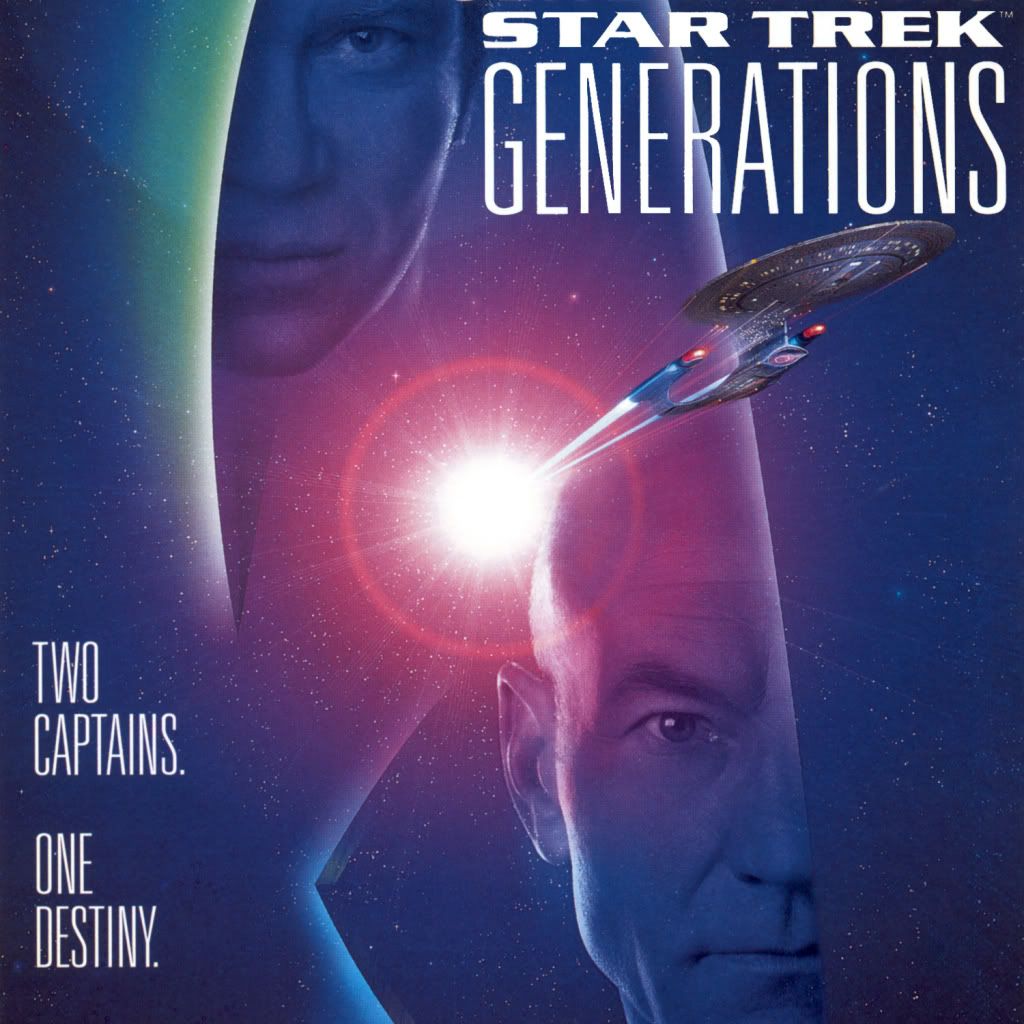Alright, I fully admit that by doing a marathon on all of the Star Trek
movies, I am stepping completely outside of our stated genre, but as a life
long Trekkie, this simply had to happen. Given the success of this
franchise, I'm betting that at least a few of our readers are also Star
Trek fans. Of course, I will stick to the usual social justice
perspective, as we work our way through the series.
Star Trek Generations is the film that bridges the gap between the original series and Star Trek The Next Generation. It begins when we see a much older Kirk, Scotty and Chekov present for the launch of USS- Enterprise B. This is the first time we are introduced to Sulu's daughter and Kirk asks when Sulu had time for a family. I think this comment is very telling because it shows exactly the kind of relationship that Kirk and Sulu have. Clearly it never progressed beyond a professional one, if Kirk didn't know that Sulu had a daughter. Kirk being Kirk, cannot stand still when the Enterprise is in trouble and he sacrifices himself to save the ship, which is being damaged by the Nexus - a utopian ribbon in space.
I found discussions of utopia quite fascinating. The idea that they can
never be real and that we cannot hold onto it and must exist in the
real world. It almost suggests that searching for happiness is not
worthwhile. It's interesting because Star Trek itself is meant to
be a utopian view of the future. In the Star Trek Universe, racism,
sexism, hunger and poverty are all supposedly things of the past, or so
they would like the audience to believe. By projecting utopia as unappealing
and unrealistic, in many ways it felt like a reversal of its own
narrative.
Flash forward to Picard's Enterprise and Worf is finally being promoted in a ceremony at sea. Picard gets a message that his nephew René is dead and becomes maudlin because this means that the Picard line is coming to and end. You see, he had never felt the burden to reproduce because of René. Thus, we have the premise of the movie - regret. It is the motivation behind Soran's drive to return to the Nexus where he can be with his family once again and the struggle of both captains between duty and family.
Thanks to Soran's machinations, Picard finds himself in the Nexus on a Christmas morning surrounded by the family he never had. He is tempted to stay there but realises that this dream world is not real and quickly takes off to find Guinan - the resident wise negro. She of course advises him to go and find Kirk so that Picard and Kirk can save the world. Why couldn't Guinan have participated in the action? Oh I know, the world must be saved by heroic unselfish White men, who put duty above everything else. It's only selfish people of colour who bother to invest in things like family, as Sulu's daughter shows us.
On the Enterprise, we have Geordi under the influence of the treacherous Duras sisters. His mind has been implanted with fake memories of Ryza. Yes, the Duras sisters are Klingon, but they embody the worst characteristics ascribed to Black women. The entire Klingon race is supremely problematic. When they are not being portrayed as the noble savage, like Worf, they are violent, and aggressive. When the Duras sisters see Beverly, they comment on how ugly human females are. This is yet another trope, which suggests that WOC are jealous of White women. This is supposed to be seen as a difference of species but cannot possibly be so, when the Duras sisters are so very clearly raced. Beverly is the quiet, intelligent, demure White woman when juxtaposed to them.
In Generations, Data turns on his emotion chip. This is clearly fan service, as Star Trek has a history of making characters who are not supposed to experience emotion, suddenly have feelings. In Generations, Data's emotions are largely used for comic relief. They bring the few moments of lightness to the entire movie but cannot on their own distract from the White male angst that permeates the movie.
There was a lot of build up to this movie because of the meeting of the two captains. In many ways it ended up being very underwhelming. I was however satisfied that at least we didn't get another long speech from Kirk summing everything up. Kirk simply died alone, as he predicted, because he didn't have Spock or Bones by his side. Kirk went out as the hero he has always been framed to be, sacrificing everything because that is what the captain of the Enterprise does. He didn't deal with his emotions or the shortcomings in his life because duty is what is most important. This was reflected in Picard as well, though he managed to survive the encounter.
Generations was successful in that it passed the baton between the old generation and the new. It wasn't elegant but succeeded in its primary goal.


